小学六年级英语70个必背重点句型(1
小学六年级英语(上册)知识归纳|人教版笔记重点

小学六年级英语(上册)知识归纳|人教版Unit 1 How do you go to school ?一、重点短语:by plane 坐飞机by ship 坐轮船on foot 步行by bike 骑自行车by bus 坐公共汽车by train 坐火车trafficlights 交通灯traffic rules 交通规则go to school 去上学get to 到达get on 上车get off 下车Stop at a red light. 红灯停Wait at ayellow light. 黄灯等Go at a green light. 绿灯行二、重点句型:1. How do you go to school ?你怎么去上学?2. Usually I go to school on foot. SometimesI go by bus. 通常我步行去上学。
有时候骑自行车去。
3. How can I get to Zhongshan Park ?我怎么到达中山公园?4. You can go by the No. 15 bus. 你可以坐15 路公共汽车去。
三、重点语法:1、There are many waysto go somewhere. 到一个地方去有许多方法。
这里的ways 一定要用复数。
因为there are 是There be 句型的复数形式。
2、on foot 步行乘坐其他交通工具大都可以用介词by⋯,但是步行只能用介词on 。
4、go to school 的前面绝对不能加the ,这里是固定搭配。
5、USA 和US 都是美国的意思。
另外America 也是美国的意思。
6、go to the park 前面一定要加the. 如果要去的地方有具体的名字,就不能再加the ,如果要去的地方没有具体名字,都要在前面加the. (go to school 除外。
)7、How do you go to ⋯?你怎样到达某个地方?如果要问的是第三人称单数,则要用:How does he/she ⋯go to ⋯?8、反义词:get on (上车)---get off (下车)near (近的)—far(远的)fast (快的)—slow (慢的)because (因为)—why (为什么)same (相同的)—different (不同的)9、近义词:see you---goodbye sure---certainly---ofcourse10、频度副词:always 总是,一直usually 通常often 经常sometimes 有时候never 从来不Unit 2 Where is the science museum ?一、重点短语:library 图书馆post office 邮局hospital 医院cinema 电影院bookstore 书店science museum 科学博物馆turnleft 向左转turn right 向右转go straight 直行north 北south 南east 东west 西next to 靠近、与⋯⋯。
外研社小学英语六年级总复习各册重点句型
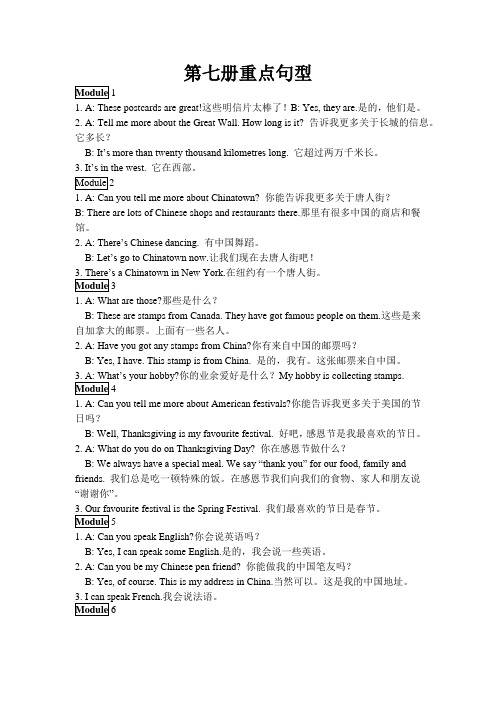
第七册重点句型1. A: These postcards are great!这些明信片太棒了!B: Yes, they are.是的,他们是。
2. A: Tell me more about the Great Wall. How long is it? 告诉我更多关于长城的信息。
它多长?B: It’s more than twenty thousand kilometres long. 它超过两万千米长。
3. It’s in the west. 它在西部。
1. A: Can you tell me more about Chinatown? 你能告诉我更多关于唐人街?B: There are lots of Chinese shops and restaurants there.那里有很多中国的商店和餐馆。
2. A: There’s Chinese dancing.有中国舞蹈。
B: Let’s go to Chinatown now.让我们现在去唐人街吧!在纽约有一个唐人街。
1. A: What are those?那些是什么?B: These are stamps from Canada. They have got famous people on them.这些是来自加拿大的邮票。
上面有一些名人。
2. A: Have you got any stamps from China?你有来自中国的邮票吗?B: Yes, I have. This stamp is from China. 是的,我有。
这张邮票来自中国。
hobby?你的业余爱好是什么?My hobby is collecting stamps.1. A: Can you tell me more about American festivals?你能告诉我更多关于美国的节日吗?B: Well, Thanksgiving is my favourite festival. 好吧,感恩节是我最喜欢的节日。
人教新课标小学六年级英语70个必背重点句型(31-40)-最新学习文档
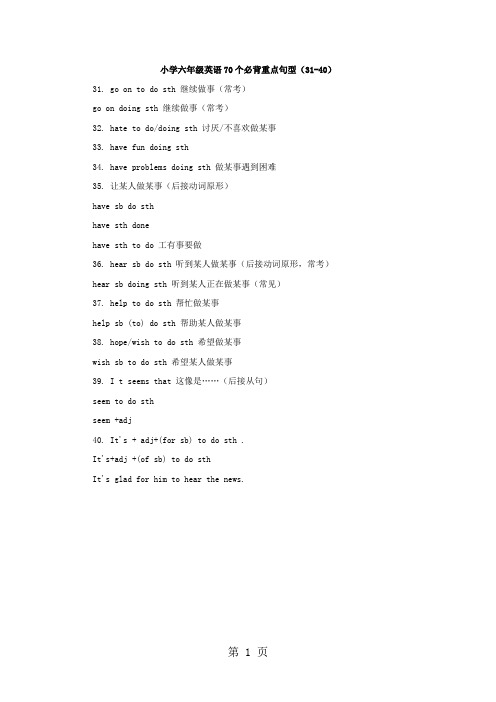
小学六年级英语70个必背重点句型(31-40)31. go on to do sth 继续做事(常考)
go on doing sth 继续做事(常考)
32. hate to do/doing sth 讨厌/不喜欢做某事
33. have fun doing sth
34. have problems doing sth 做某事遇到困难
35. 让某人做某事(后接动词原形)
have sb do sth
have sth done
have sth to do 工有事要做
36. hear sb do sth 听到某人做某事(后接动词原形,常考)hear sb doing sth 听到某人正在做某事(常见)
37. help to do sth 帮忙做某事
help sb (to) do sth 帮助某人做某事
38. hope/wish to do sth 希望做某事
wish sb to do sth 希望某人做某事
39. I t seems that 这像是……(后接从句)
seem to do sth
seem +adj
40. It's + adj+(for sb) to do sth .
It's+adj +(of sb) to do sth
It's glad for him to hear the news.
第 1 页。
小学六年级英语语法知识点汇总1
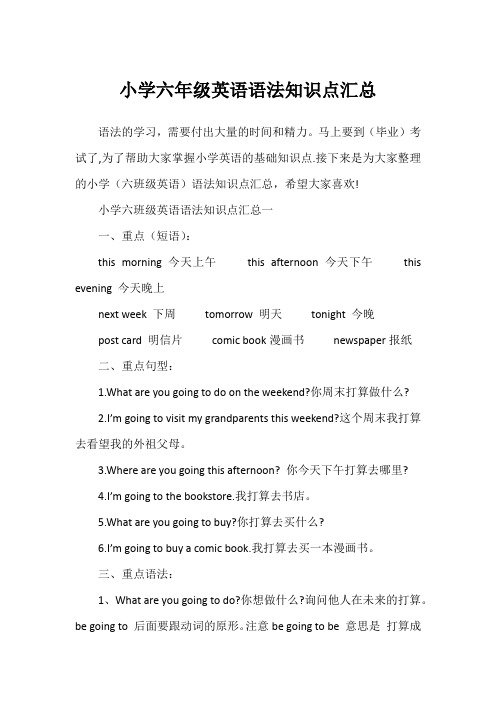
小学六年级英语语法知识点汇总语法的学习,需要付出大量的时间和精力。
马上要到(毕业)考试了,为了帮助大家掌握小学英语的基础知识点.接下来是为大家整理的小学(六班级英语)语法知识点汇总,希望大家喜欢!小学六班级英语语法知识点汇总一一、重点(短语):this morning 今天上午this afternoon 今天下午this evening 今天晚上next week 下周tomorrow 明天tonight 今晚post card 明信片comic book漫画书newspaper报纸二、重点句型:1.What are you going to do on the weekend?你周末打算做什么?2.I’m going to visit my grandparents this weekend?这个周末我打算去看望我的外祖父母。
3.Where are you going this afternoon? 你今天下午打算去哪里?4.I’m going to the bookstore.我打算去书店。
5.What are you going to buy?你打算去买什么?6.I’m going to buy a comic book.我打算去买一本漫画书。
三、重点语法:1、What are you going to do?你想做什么?询问他人在未来的打算。
be going to 后面要跟动词的原形。
注意be going to be 意思是打算成为什么,干什么职业。
注意一下(句子)的区别,找出正确回答。
What are you going to do this afternoon?What are you going to buy?What are you going to be?When? are you going?Where are you going?How are you going?Who are you going with?2、this evening 和tonight的区别:this evening指的是今天晚上睡觉以前的时间,一般指晚上十二点以前。
人教版六年级英语上册全册重点句型复习
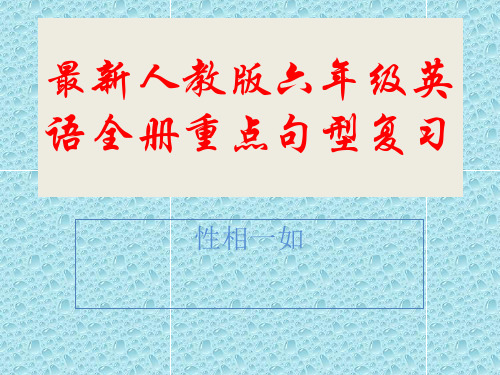
性相一如
1、Where Is the hospital? It’s in front of the cinema.
问路句型
Where is +地点? It’s +表示位置的短语。
2、How can we get there? Turn left at the bookstore.
• Hobbies, are, what, your(?) • What are your hobbies? • Like,she,dancing,does(?) • Does she like dancing? • Live, I, in, Changsha(.) • I live in Changsha. • I,like, reading, stories,also(.) • I also like reading stories.
2、以不发音的字母e结尾,去e加ing • 如make---making,write---writing • 末尾只有一个辅音字母的重读闭音节,双写末
尾辅音字母,再加ing,如stop—stopping, begin--beginning
Does he live in Sydney? No,he doesn’t.
做什么的?
Where does he work? He works at sea .
询问他人的工作地点 Where does +主语(第三人称单数)+work? He/She works +表示地点的介词短语 询问他人上班方式句型及答语 How does +主语(第三人称单数 )+go to work? He/She goes to work +出行方式(by bike , on foot , by bus …)
六年级英语必背知识点
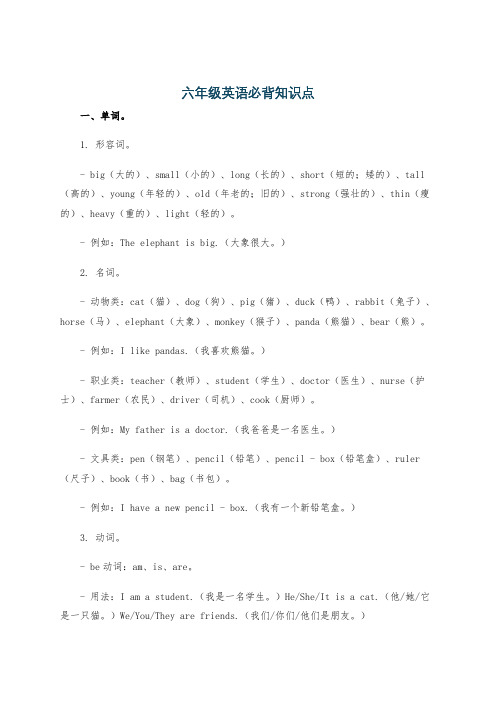
六年级英语必背知识点一、单词。
1. 形容词。
- big(大的)、small(小的)、long(长的)、short(短的;矮的)、tall (高的)、young(年轻的)、old(年老的;旧的)、strong(强壮的)、thin(瘦的)、heavy(重的)、light(轻的)。
- 例如:The elephant is big.(大象很大。
)2. 名词。
- 动物类:cat(猫)、dog(狗)、pig(猪)、duck(鸭)、rabbit(兔子)、horse(马)、elephant(大象)、monkey(猴子)、panda(熊猫)、bear(熊)。
- 例如:I like pandas.(我喜欢熊猫。
)- 职业类:teacher(教师)、student(学生)、doctor(医生)、nurse(护士)、farmer(农民)、driver(司机)、cook(厨师)。
- 例如:My father is a doctor.(我爸爸是一名医生。
)- 文具类:pen(钢笔)、pencil(铅笔)、pencil - box(铅笔盒)、ruler (尺子)、book(书)、bag(书包)。
- 例如:I have a new pencil - box.(我有一个新铅笔盒。
)3. 动词。
- be动词:am、is、are。
- 用法:I am a student.(我是一名学生。
)He/She/It is a cat.(他/她/它是一只猫。
)We/You/They are friends.(我们/你们/他们是朋友。
)- 实义动词:have(有)、like(喜欢)、go(去)、come(来)、play(玩)等。
- 例如:I have a book.(我有一本书。
)She likes dancing.(她喜欢跳舞。
)二、句型。
1. 介绍人物或事物。
- This is my father.(这是我爸爸。
)- That is a big tree.(那是一棵大树。
小学六年级英语(上册)知识归纳|人教版 笔记 重点
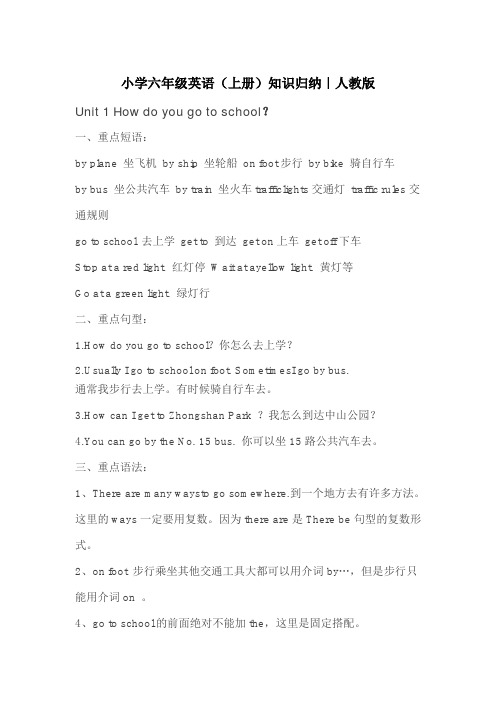
小学六年级英语(上册)知识归纳|人教版Unit 1 How do you go to school?一、重点短语:by plane 坐飞机by ship 坐轮船on foot步行by bike 骑自行车by bus 坐公共汽车by train 坐火车trafficlights交通灯traffic rules交通规则go to school 去上学get to 到达get on上车get off下车Stop at a red light. 红灯停Wait at ayellow light. 黄灯等Go at a green light. 绿灯行二、重点句型:1.How do you go to school?你怎么去上学?ually I go to school on foot. SometimesI go by bus.通常我步行去上学。
有时候骑自行车去。
3.How can I get to Zhongshan Park ?我怎么到达中山公园?4.You can go by the No. 15 bus. 你可以坐15路公共汽车去。
三、重点语法:1、There are many waysto go somewhere.到一个地方去有许多方法。
这里的ways一定要用复数。
因为there are是There be句型的复数形式。
2、on foot 步行乘坐其他交通工具大都可以用介词by…,但是步行只能用介词on 。
4、go to school的前面绝对不能加the,这里是固定搭配。
5、USA 和US 都是美国的意思。
另外America也是美国的意思。
6、go to the park 前面一定要加the. 如果要去的地方有具体的名字,就不能再加the ,如果要去的地方没有具体名字,都要在前面加the. (go to school除外。
)7、How do you go to …?你怎样到达某个地方?如果要问的是第三人称单数,则要用:How does he/she…go to …?8、反义词:get on(上车)---get off(下车)near(近的)—far(远的)fast(快的)—slow(慢的)because(因为)—why(为什么)same(相同的)—different(不同的)9、近义词:see you---goodbye sure---certainly---ofcourse10、频度副词:always 总是,一直usually 通常often经常sometimes 有时候never 从来不Unit 2 Where is the science museum?一、重点短语:library 图书馆post office 邮局hospital医院cinema 电影院bookstore书店science museum科学博物馆turnleft向左转turn right 向右转go straight 直行north北south南east东west西next to靠近、与……。
小学人教PEP英语六年级上册重点单词、短语、句型汇总
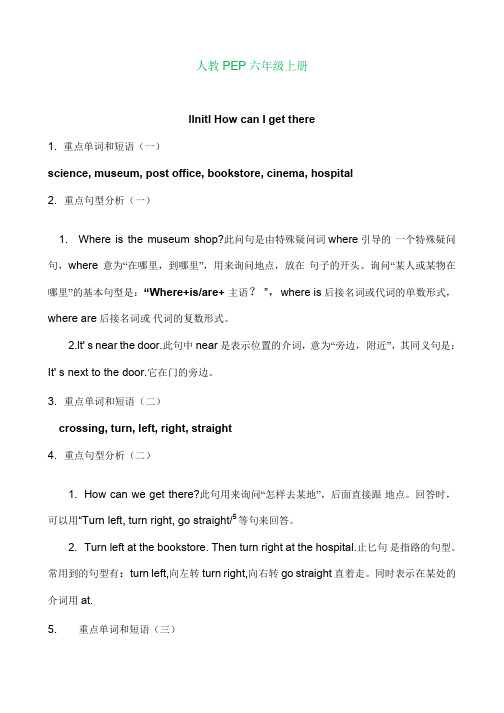
人教PEP六年级上册llnitl How can I get there1. 重点单词和短语(一)science, museum, post office, bookstore, cinema, hospital2. 重点句型分析(一)1. Where is the museum shop?此问句是由特殊疑问词where引导的一个特殊疑问句,where意为“在哪里,到哪里”,用来询问地点,放在句子的开头。
询问“某人或某物在哪里”的基本句型是:“Where+is/are+ 主语?”,where is后接名词或代词的单数形式,where are后接名词或代词的复数形式。
2.lt' s near the door.此句中near是表示位置的介词,意为“旁边,附近”,其同义句是:It' s next to the door.它在门的旁边。
3. 重点单词和短语(二)crossing, turn, left, right, straight4. 重点句型分析(二)1. How can we get there?此句用来询问“怎样去某地”,后面直接跟地点。
回答时,可以用“Turn left, turn right, go straight/5等句来回答。
2. Turn left at the bookstore. Then turn right at the hospital.止匕句是指路的句型。
常用到的句型有:turn left,向左转turn right,向右转go straight直着走。
同时表示在某处的介词用at.5. 重点单词和短语(三)Tasty, buy, London Eye, next to, far from, go straight, turn left, stomach 6. 重点句型分析(三)Is the Thames far from here? No.此句是个be动词开头的一般疑问句,其回答要用yes或no.句中的far from意为“离 ............................................. 远”。
- 1、下载文档前请自行甄别文档内容的完整性,平台不提供额外的编辑、内容补充、找答案等附加服务。
- 2、"仅部分预览"的文档,不可在线预览部分如存在完整性等问题,可反馈申请退款(可完整预览的文档不适用该条件!)。
- 3、如文档侵犯您的权益,请联系客服反馈,我们会尽快为您处理(人工客服工作时间:9:00-18:30)。
英语70个必背重点句型(1-10)1. allow sb to do sth 允许某人去做某事(后接动词不定式)My father allowed me to go out for a walk after finishing my homework.2. asked sb (not) to do sth 叫某人做事某事(叫某人不要去做某事)My father asked me to study hard.He asked me not to swim alone.be asked to do sth 被叫去做某事/被邀请去做某事I was asked to have a dinner with them yesterday.3. be afraid to do sth 害怕做某事She is afraid to ask me questions.4. be afaid of doing sth 害怕做某事I am afraid of going out at night.5. be afaid of sth 害怕某物He is afraid of snakes.6. be amazed to do sth 对做某事感到惊讶He was amazed to meet the girl there.be amazed at sth 对某事感到惊讶they were amazed at the news.7. be busy doing/with sth 忙于做某事(常考)I was busy washing my car at that time. 那时候我正忙于清洗我的车子。
I am busy with my work.8. be coming/going/leaving/fiying/moving/dying(某些位移动词用进行时态时表将来)the bus is coming/the dog is dying.9. be excited to do sth 对做……感到兴奋Jacky was excited to travel there by plane.be excited at sthLily was excited at his words.be excited about doing sthhe was excited about passing the exam without going overing books.10. be frightened to do sth 害怕去做某事Sam is frightened to ride a horse小学六年级英语70个必背重点句型(11-20)11. be glad/happy to do sth 高兴去做某事she is happy to clean the blackboard with me.be pleased to do sth高兴做某事she was pleased to help the old man yesterday.be pleased with sth 对某事感到高兴/满意the teacher was pleased with my answer.12.be interested in sth/doing sth 对某事感兴趣/对做某事感兴趣she is interested in swimming in the river.My btother is interested in Chinese.13. be/get ready for/to do sthBe ready for sth 为某事做好了准备We are ready for the exam.Be ready to do sth 为做某事做好了准备We are ready to have a birthday party for her.get ready for sth为某事在做准备We are getting ready for the exam.get ready for sth 为做某事而做准备13. be sorry to do sth 对做某事感到抱歉14. be surprised to do sth 对做某事感到惊奇be surprised at sth 对某事感到惊奇15. be worth doing sth 值得做某事(worth 后接动词-ing形式,常考)16. 开始去做某事begin to do sthbegin/start to do/doing sth17. can/be able to afford (to buy) sth 有能力购买(供)……18. can/may/must do sth could/would/should/might do sth19. can't wait to do sth 迫不急待地去做某事20. decide to do sth 决定去做某事make up one's mind to do sth 下决心去做某事(常考)make a decision to do sth 对做某事作出决定21. deserve to do sth 值得/应该做……22. encourage sb to do sth 鼓励某人去做某事23. enjoy doing sth 乐意去做某事24. expect (sb) to do sth 期望去做某事25. fail to do sth 做某事失败succeed doing sth 成功做了某事26. finish doing sth 做完某事(后接动词-ing形式)(常考)27. follow sb to do sth 跟随某人去做某事28. 让某人做某事(后接动词原形)get sb to do sthmake sb do sthlet sb do sth29. get/have a chance to do sth 得到一个做某事的机会30. give/pass/show/lend/sell sb sth/sth to sbbuy/get/bring sb sth/sth for sb31. go on to do sth 继续做事(常考)go on doing sth 继续做事(常考)32. hate to do/doing sth 讨厌/不喜欢做某事33. have fun doing sth34. have problems doing sth 做某事遇到困难35. 让某人做某事(后接动词原形)have sb do sthhave sth donehave sth to do 工有事要做36. hear sb do sth 听到某人做某事(后接动词原形,常考)hear sb doing sth 听到某人正在做某事(常见)37. help to do sth 帮忙做某事help sb (to) do sth 帮助某人做某事38. hope/wish to do sth 希望做某事wish sb to do sth 希望某人做某事39. I t seems that 这像是……(后接从句)seem to do sthseem +adj40. It's + adj+(for sb) to do sth .It's+adj +(of sb) to do sthIt's glad for him to hear the news.41. It takes sb some time/money to do sth . 花费某人多长时间做某事(常考)42. pay …for… cost spend…on….. it take …to do sth43. It's best for sb to do sth. 对某人来说做某事是最好的had better do sth 最好做某事(注意had没有时态和人称的变化,better后接动词原形)44. It's time for sb to do sth 是某人做某事的时候了45. keep (on)doing sth 坚持做某事(常考)keep sb doing sth 让某人做某事(常考)keep sb from doing sth 阻止某人做某事(常考)keep sb/sth +adjkeep the book for 2 days 借这本书两天(不要用borrow或lend)46. learn to do sth 学做某事learn sth from sb 向某人学习47. like to do/doing sth 喜欢做某事like sb to do sth 喜欢某人做某事48. need to do sth 需要做某事need doing sth/to be doneneed sth needn't do sth49. prefer to do sth rather than do sth 宁愿……而不愿……(常考)prefer doing sth to doing sth 喜欢做……胜过做……I prefer reading books to going shopping. 比起购物来,我更爱读书。
prefer to do sth 喜欢(爱)做某事50. refuse to do sth 拒绝做……51.(常考)remember/forget to do sth 记得/忘记做某事remember/forget doing sth 记得/忘记做过某事52. see sb do sth 看见某人做某事(结果)see sb doing sth 看见某人正在做某事(正在进行中)be seen to do sth 做某事被看见53. something to eat/drink 一些吃/喝的东西(词不定式放在something等后修饰这些词)I need something to eat. 我要一些吃的东西。
54. spend some time (in)doing sth /on sth 花费时间做某事(注意动词要用ing形式)(常考)spend some money on sth/doing sth 买……花了多少钱55. Sth is hard/difficult/easy to do . 做好某事很难/容易56. stop to do sth 停下来去某事(两件事)(常考)stop doing sth 停止做某事(一件事)(常考)stop sb (from) doing sth 阻止某人做某事(常考)57. take turns to do sth 轮流做……58. tell sb (not) to do sth 叫某人去(不要)做某事be told to do sth 被告知不要做某事59. There is no need (for sb) to do sth 对某人来说没必要做某事60. There is no time (for sb ) to do sthhave no time to do sth 没时间做某事61. too…(for sb) to …太……以致不能…… so… that…not… enough to doThe boy is too young to go to school. 那男孩太小了以致不能上学。
